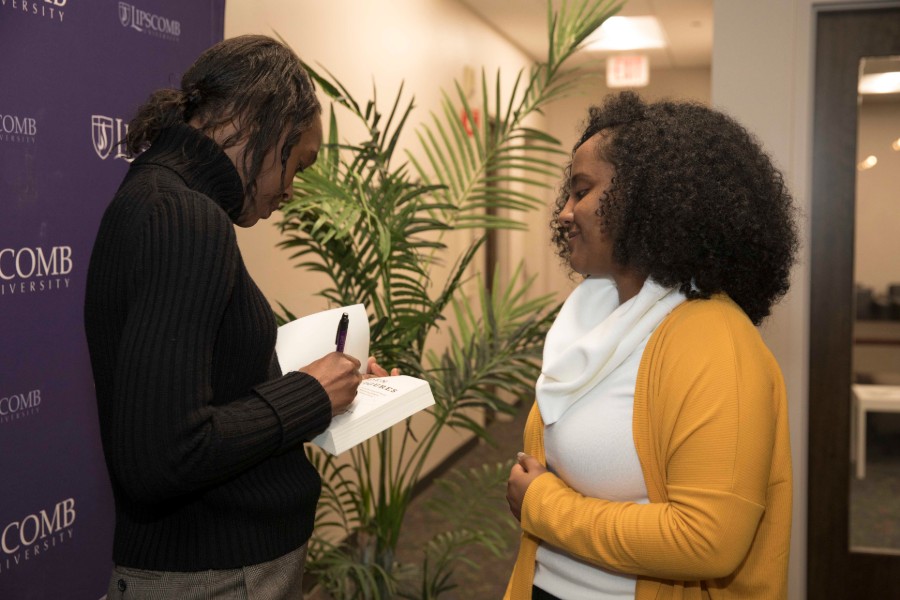Hidden Figures author visits campus, inspires local students and community
In today’s "fractured times," we as a society need a story of hope, said author Margot Lee Shetterly from Lipscomb University’s Collins Auditorium on Feb. 19.
Janel Shoun-Smith |

Margot Lee Shetterly, author of Hidden Figures, signs a book for a student who attended her talk at Lipscomb on Feb. 19.
In her talk, Shetterly discussed the popular appeal of her 2016 book Hidden Figures, the true story of the African-American, female "human computers," or mathematicians, who began working at the NASA laboratory at Langley, Virginia, in the 1950s.
Shetterly spoke to both an auditorium full of public school students and a gathering of community members that evening as part of a day-long celebration of STEM education coordinated by Lipscomb’s Raymond B. Jones College of Engineering for National Engineers Week in partnership with the Department of English and Modern Languages and the Landiss Lecture Series.
Shetterly’s visit also coincided with the city’s Nashville Reads campaign to encourage all Nashvillians to read Shetterly’s nonfiction book at some point during 2019. Nashville Mayor David Briley was on hand to introduce the author to the attendees.
Hidden Figures author Margot Lee Shetterly stopped by the Lipscomb campus on Feb. 19 to share the story behind her work.
According to Shetterly, not only has her historical book, her first as an author, been translated into 17 languages and been adapted into an Oscar-nominated film, but the phrase “hidden figures” itself has become “a catchphrase for something meaningful that has languished in history,” as few people knew of the crucial role of human computers before her book was published.
During her Landiss Lecture Series presentation, Shetterly briefly outlined how she came to write the story of the human computers, who worked in Langley where she grew up with a father who also worked in the NASA lab.
But it was well into her adult career, in December 2010, before she conversed with two former NASA computers, Kathleen Land, who had been her Sunday School teacher as a child, and Katherine Johnson, a former NASA computer whose calculations were critical to the early manned spaceflight missions and whose experiences became the lead story in the Hidden Figures movie. Those two conversations piqued her interest to learn more.
Shetterly outlined several reasons why she believes the story behind Hidden Figures has captured the imagination of America since it was published in 2016.
Particularly for women navigating today’s workplace, “these women’s stories aren’t a fairy tale or simple inspiration. They are a playbook in how to challenge bias, disarm difficult colleagues, in learning how to set expectations high and refusing to take no for an answer,” Shetterly said.

She believes that readers of the book, and viewers of the movie, were inspired by the motif of “looking beyond,” presented most obviously in the NASA scientists, engineers and mathematicians looking beyond our own earth into outer space, but also through the women of Hidden Figures “looking beyond” in their own personal and social ways, she said.
“These black women that I wrote about were looking beyond all these barriers, sitting beside these people for the first time who seemed so different and not knowing what the expectations will be,” she said. “But doing something that had never been done before, that was never a deterrent to these women. They really considered themselves intrepid women of science and also agents of social change.”
In addition, Hidden Figures is “a story about the importance of mission,” Shetterly said.
Reminding the audience of the incredible boldness of the goal Pres. John F. Kennedy set for NASA when he declared we would send men to the moon within a decade, Shetterly noted how having that bold goal brought out the best in our American science community and in our society.
“The history behind Hidden Figures shows us what is possible when we push people with the brightest lights to step out of the shadows. No matter who they are or where they are from. It is an inherently optimistic story,” Shetterly said. “It shows what we could do when we think of innovation as something that applies to people as much as it applies to processes and problems.
“These women and their story are evidence that even in fractured times like these, when so many of us see ourselves as incompatibly different from our neighbor, colleagues and fellow citizens, that we can still see some things the same way,” she said. “That there might be a glimmer of hope for that other mission: the American dream.”
During the day-long celebration of STEM education on the Lipscomb campus, more than 800 middle and high school students from Nashville-area schools got hands-on learning experiences through a variety of activities including an Oak Ridge National Laboratory traveling science fair, making binary bracelets, mathematical magic, erasure poetry and drama presentations among others.
Sponsors for Engineering Day activities include:
Silver Sponsor: Atmos Energy
Bronze Sponsors: Fifth Third Bank, Nashville Electric Service, the Peugeot Center for Engineering Missions in Developing Communities and Wright and Company, Incorporated
School Sponsors: Asurion, the Motiv-eight Foundation, Power Consulting Associates, Smith Seckman Reid, Stantec, the Tennessee Titans Foundation, Turner Construction, Women in Technology of Tennessee.
Additional Sponsors: ABG Caulking, Ross Bryan, the Wal-Mart Foundation, Little Debbie/McKee Foods, the Oak Ridge National Laboratory and NASA.
Want to know more? Visit engineering.lipscomb.edu or www.lipscomb.edu/english-modern-languages.
— Photos by Kristi Jones
— Video by Josh Shaw and Noah Bassett
